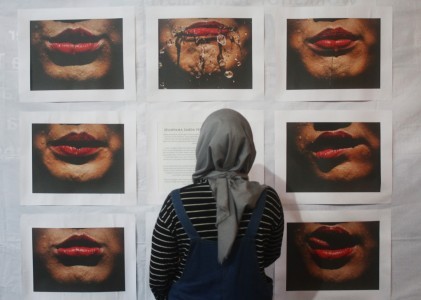Popular Reads
Top Results
Can't find what you're looking for?
View all search resultsPopular Reads
Top Results
Can't find what you're looking for?
View all search resultsCultural barriers hamper women's political participation: UN Women
Change text size
Gift Premium Articles
to Anyone
 A visitor looks at images displayed at the "Woman On Top" exhibition at Cafe Mug in Malang, East Java, on May 5. The exhibition, held by students of the free Sunday School Photography initiative from the Malang branch of the Indonesian Photojournalists Association (PFI), was part of a social awareness campaign to help inspire women. (Antara/Ari Bowo Sucipto)
A visitor looks at images displayed at the "Woman On Top" exhibition at Cafe Mug in Malang, East Java, on May 5. The exhibition, held by students of the free Sunday School Photography initiative from the Malang branch of the Indonesian Photojournalists Association (PFI), was part of a social awareness campaign to help inspire women. (Antara/Ari Bowo Sucipto)
I
ndonesia needs to fully implement policies that support women and put a stop to gender stereotyping to increase women's participation in politics, a UN Women senior official said on Thursday.
Indonesia has made many achievements in laws and policies, said UN Women's regional director for Asia and the Pacific, Roberta Clarke, citing improvements such as institutional change and increased understanding of accountability to implement the Convention on the Elimination of all Forms of Discrimination Against Women (CEDAW).
Clarke referred to the 2012 Legislative Elections Law as a commendable effort to break down the culture of exclusion regarding women's participation in politics. The law stipulates that political parties must include at least 30 percent women on their lists of legislative candidates.
However, in practice this evidently falls short of expectations.
Data from the House of Representatives shows that of lawmakers serving in the 2014 to 2019 period, only 97 of 506 members are women, totaling 17 percent, which was a slight fall from 103 women in the previous period.
Clarke urged the government to address cultural practices that played a major role in gender stereotyping in order to create change.
"First of all, you have to remove the cultural barriers that prevent women from participating in politics," she said at an event in Jakarta on Thursday.
Citing a study conducted by the ASEAN Committee on Women that was supported by Women in Canada, Clarke said family barriers proved to be the most prominent factor. Such cases directly concern gender expectations and stereotypes, which she said must be transformed.
"We all have to accept and live the principles of non-discrimination and equality of opportunity," said Clarke.
Gender stereotyping also occurs within political parties, she added. Clarke expressed concern over hurdles created by political parties that stopped women from becoming equal participants in political processes.
However, Clarke also conveyed optimism on the nation's ability to tackle inequality in political participation. When asked whether Indonesia could achieve what Canada has – a gender balanced Cabinet – Clarke affirmatively said yes.
"It just means that somebody has to take the decision to do it," she said, adding that it needed to be accompanied by a strong social movement.
The public also plays a part in the process, including being proactive in asking hard questions and holding political actors accountable.
Furthermore, men needed to be engaged in the issue, Clarke added. For example, men needed to share more of the work in caring for children so that women could be involved in politics and the economy in different ways.
"Challenges remain, but there is strong political will to change those," Clarke said, while commending President Joko "Jokowi" Widodo for supporting the HeForShe campaign, a worldwide initiative from UN Women launched in 2014 to engage men in the fight for gender equality.
There must be increased investment from the government, including to support capacity building of women, she added. (rin)









